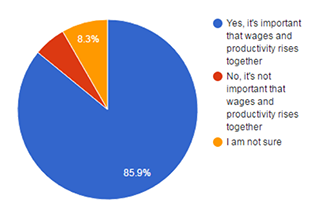Week 2: Career Planning First Step
This week we begin our career planning exercise. This exercise will be done in steps as we progress through the course. At the end you will have a document you can use as your Personal Career Development Plan. We will do the first phase of the plan as this week’s assignment.
The first step in any career plan is to figure out what type of work interests you and what education and skills you will need to find a good job / career in that field of work. There are lots of different instruments available (most for a price) to do this. You can use any of your choosing but we recommend using the U.S. Department of Labor’s O*Net Short Interest Profiler because it is free of charge, easily accessible, and provides useful information on the levels of education associated with different occupations within a given field of work.
Once you complete the questions, the Profiler arrays the strength of your interests across six dimensions: Realistic, Investigative, Artistic, Social, Enterprising, and Conventional. It will then list a range of occupations that match your profile, allow you to choose the level of the occupation/career you would like to achieve, and identify the education you will need to obtain a position at that level.
Students' responses to the question: Do you feel it’s important that wages and productivity rises together?

For this assignment, there are four steps:
- Complete the U.S. Department of Labor O*Net Interest Profiler and identify a job that you might like to pursue.
- After identifying a job you might like to pursue, find people who work in that or a similar job: You can ask family or friends. You can also search the internet for professional communities online and post questions (for example, enter the job name + "forum" or "online community" into your search browser and create an account, if necessary).
- Ask these individuals for their opinions: What do they like and dislike about their job? How are they treated by their organization? Do they have recommendations for someone who is considering this line of work?
- Write up your experiences and submit them for peer review. Be sure to describe the job you considered, where you turned for information, and the feedback that you received.
- Week 3: Good Job Survey
Visit an organization and rate it based on the “good jobs” app provided on the survey website: 2016 Good Jobs Survey (PDF). This can be the organization you work for or have worked for in the past or an organization where you shop as a customer, or some other organization you know well. Report the data on the course website with a comment on what it would take to make it a truly “Great Company and Great Place to Work!”
- Which company did you choose and what is your relationship with the company (e.g., employee, customer)?
- In your opinion, what practices make this employer a "high road" or "low road" employer?
- If you were writing a letter to management, what tangible recommendations for improvement would you give?
Week 2 Poll Data: Post-war Social Contract
Students' responses to the following question: Do you feel it’s important that wages and productivity rises together?
- 85.9% Yes, it's important that wages and productivity rises together
- 5.8% No, it's not important that wages and productivity rises together
- 8.3% I am not sure
Discussion Forum: Wages and Productivity
In the discussion forum, students were asked to elaborate on their ideas: If they feel that it's important for wages and productivity to rise in tandem, and discuss why they feel this way. If they feel this divergence is not important, explain this point of view.
